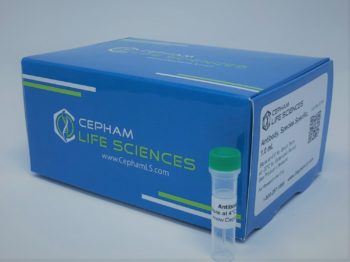Description
Aliases
Apo-D, ApoD, APOD
Antibody Type
Polyclonal Antibody
Species
Human
Uniprot ID
P05090
Immunogen
Recombinant human Apolipoprotein D protein (21-189AA)
Raised In
Rabbit
Species Reactivity
Human
Tested Applications
ELISA;Not yet tested in other applications.
Background / Function
APOD occurs in the macromolecular complex with lecithin-cholesterol acyltransferase. It is probably involved in the transport and binding of bilin. Appears to be able to transport a variety of ligands in a number of different contexts.
Isotype
IgG
Conjugate
FITC
Storage Buffer
Preservative: 0.03% Proclin 300
Constituents: 50% Glycerol, 0.01M PBS, PH 7.4
Form
Liquid
Storage
Shipped at 4°C. Upon delivery aliquot and store at -20°C or -80°C. Avoid repeated freeze.
Purity
Caprylic Acid Ammonium Sulfate Precipitation purified
Modification
APOD
Literature
[1]”Characterization of single-nucleotide polymorphisms in coding regions of human genes.”Cargill M., Altshuler D., Ireland J., Sklar P., Ardlie K., Patil N., Shaw N., Lane C.R., Lim E.P., Kalyanaraman N., Nemesh J., Ziaugra L., Friedland L., Rolfe A., Warrington J., Lipshutz R., Daley G.Q., Lander E.S. Nat. Genet. 22:231-238(1998). [2]”Site-specific detection and structural characterization of the glycosylation of human plasma proteins lecithin:cholesterol acyltransferase and apolipoprotein D using HPLC/electrospray mass spectrometry and sequential glycosidase digestion.”Schindler P.A., Settineri C.A., Collet X., Fielding C.J., Burlingame A.L.Protein Sci. 4:791-803(1994). [3]”An enzyme assisted RP-RPLC approach for in-depth analysis of human liver phosphoproteome.”Bian Y., Song C., Cheng K., Dong M., Wang F., Huang J., Sun D., Wang L., Ye M., Zou H.J. Proteomics 96:253-262(2013).Additional information
| Size | 50μg, 100μg |
|---|


